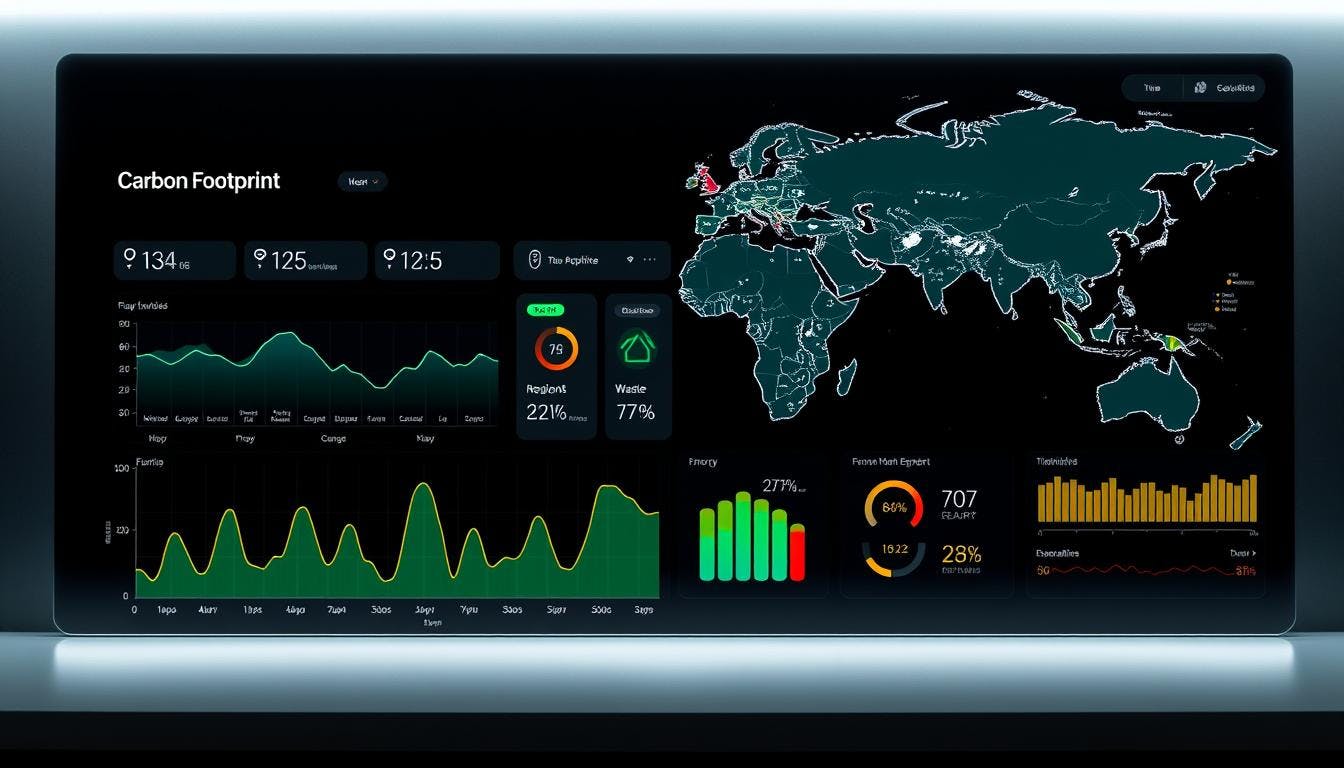Sign up. Be inspired. Get clicking.
Comparison of sustainable property options on major OTAs
Today, travelers are more aware of their carbon footprint. They search for places to stay that match their low-impact values. Big names like Booking.com, Expedia, and Skyscanner are now offering these options. These sites offer tools like carbon offset programs and sustainable certification filters. For instance, Skyscanner’s Greener Choices label shows flights with lower emissions. Booking.com’s Travel Sustainable Badge covers over 100,000 properties worldwide.
Expedia Group has been a leader since 2006, offering carbon offset options for flights. This makes it simpler for travelers to book environmentally supportive travel. This change shows a growing trend toward sustainable travel in the industry.


Why sustainable travel matters in today’s world
Sustainable travel is now a global need, not just a trend. The tourism industry is responsible for 8% of global carbon emissions, more than aviation. This big impact has changed how people travel and how the industry responds. Recent studies show 61% of travelers choose sustainable travel. This demand is changing the hospitality market. Properties with sustainable-certifications see a 22% revenue boost, as shown in 2023 AllTheRooms data.
Big names in the industry are answering this call. Skyscanner aims to cut emissions by half by 2030, as part of COP26. Agoda’s Eco Deals campaign donates to WWF, showing the economic benefits of sustainable choices. Expedia Group, a signatory of the Glasgow Declaration, is leading the way. Their efforts show how the hospitality sector can be both profitable and environmentally supportive. These actions highlight a broader trend toward low-impact travel.
Key features of sustainable properties on OTAs
Today's travelers want places that care about the planet. Big platforms highlight key features to help users choose wisely. These include energy-saving systems, water-saving methods, and waste reduction. Google Travel lists 12 sustainability practices per property. These include using renewable energy and ecologically supportive cleaning products. TripAdvisor’s GreenLeaders program, started in 2014, looks at eight criteria, including recycling and supporting local communities.
LEED certification requires a 40% cut in energy use. Green Key’s 55-point system checks waste and water management. These standards ensure properties meet high nature-oriented benchmarks.
- Solar panel adoption rates vary across platforms. EcoBnB leads with 23% of listings, compared to the industry average of 9%.
- Airbnb’s eco-filter includes EV charging stations, organic linens, and greywater systems.
- Momondo’s CO2 sorter reduces emissions by 17% per booking, making it easier to choose more sustainable options.


How major OTAs are leading the way in sustainable travel
Large online platforms are transforming the way we select low-impact travel. They've introduced new tools and programs to help. The formation of the Travalyst coalition represents a significant advancement. The coalition established a standard for measuring emissions. Google, Booking.com, and TripAdvisor now use this standard. This technique makes it easier to see how ecologically compliant a place is.
Carbon offset programs are also important. Both Expedia and Kayak have made significant progress in their sustainability efforts. Kayak's tool has cut emissions by 14%. Expedia lets you see how much carbon you'll save in real time. Booking.com is investing in ecologically related research. They spend $2M a year on new ideas. This helps them offer better sustainable options and sets a high standard.
Google has added sustainability-certified badges to 1.2 million places in 2023. This makes it easy to find low-impact places to stay. It helps travelers find what they're looking for. Agoda is focusing on local sustainable efforts. They offer 15% off for donations to marine conservation. This supports local ecosystems and encourages more nature-oriented travel.
These changes by online travel agencies are making a big difference. They're not just helping the planet. They're also making travel better for everyone. By focusing on sustainability, they're setting a new standard.
Sustainable, low-impact certifications to look for on OTAs
Low-impact certifications are key for finding sustainable places to stay. They show that a place meets high environmental standards. This information helps travelers make better choices. Look for the EU Ecolabel and Green Seal. The EU Ecolabel means a place uses 30% less energy. Green Seal means a place follows 78 chemical standards for safety.
Different certifications have different rules and checks. Here's a quick look:
- Green Key checks places every year. EarthCheck does it twice a year.
- STEP has a 4-tier system for new ecologically supportive places.
- Ibex Fairstay needs a score of 40/100 for community impact.
Certification costs vary a lot. LEED can cost between $2,000 and $25,000. Green Tourism is cheaper, costing between $500 and $1,500. This makes it easier for smaller places to get certified.
Booking.com and Expedia make it easy to find ecologically efficient places. Booking.com supports seven certifications. Expedia lists four. This information makes it simple for travelers to find what they're looking for.


Carbon footprint tracking and offset options
Tracking carbon emissions is now a key feature for environmentally conscious travelers. Platforms are integrating tools to measure and offset environmental impact. This shift helps users make sustainable choices with every booking.
Expedia’s Cool Effect partnership offset 82,000 tons of CO2 in 2022. Trip.com’s CHOOOSE integration calculates emissions per room night. These initiatives provide accurate data for travelers to understand their footprint.
- Offset costs vary: $3 per ton on eDreams vs $5 on Skyscanner.
- Kayak’s Atmosfair algorithm has a ±9% accuracy rate compared to actual emissions.
- Google Flights’ emissions estimates cover 98% of global routes.
- Momondo’s FAQ section reduced customer queries by 31%.
- Expedia’s TerraPass program offers bulk offsets for corporate bookings.
These tools and programs simplify sustainable travel. By choosing platforms with carbon tracking, travelers can reduce their environmental impact. Small changes in bookings can lead to significant global benefits.
User experience: finding sustainable properties made easy
Platforms are streamlining the search for environmentally conscious accommodations. Features like advanced filters and badges simplify the process. Travelers can now make informed choices with ease. Airbnb’s eco-filter usage grew 140% year-over-year. Hipcamp saw a 67% increase in nature stay bookings after updating its user interface. These changes highlight the growing demand for sustainable travel options.
Filter depth varies across platforms. BookDifferent offers six parameters, while Agoda provides three. This difference impacts how travelers refine their search results. Booking.com conducted A/B tests for its Travel Sustainable badge placement. The optimal position increased visibility and engagement. Such improvements enhance the user experience. Google displays 12 sustainability practice icons per listing. These icons provide quick information about environmentally supportive features. This approach helps travelers make faster decisions.
Mobile apps are also driving adoption. 73% of Skyscanner’s low-impact choices are made via its app. This trend reflects the convenience of mobile platforms. Voice search integration is another innovation. Google Travel now supports nature-related queries. This feature caters to tech-savvy travelers seeking sustainable options. These advancements make it easier for travelers to find sustainable experiences. By leveraging these tools, users can contribute to a more sustainable future.
Comparing the top OTAs for sustainable accommodations
Travel platforms are evolving to meet the demand for sustainable stays. Leading sites now offer tools to help travelers make nature-supportive choices. Booking.com leads with over 100,000 certified properties, while EcoBnB features 89% of its listings with solar panels. Certification diversity varies across platforms. Booking.com supports eight certifications, compared to Expedia’s four. This difference impacts the range of options available to users.
Offset integration also differs. Trip.com provides instant calculations, while eDreams offers post-booking offsets. These features cater to varying traveler preferences.
- Price premiums for ecological-stays range from 15% on EcoBnB to 22% based on AllTheRooms data.
- Mobile features include Kayak’s CO2 sorter and Google’s layered filters, enhancing user experience.
- Educational resources like Booking.com’s reports and Momondo’s blog help travelers make informed choices.
These innovations make it easier for travelers to find sustainable stays. By leveraging these tools, users can contribute to a sustainable future.
Platform-specific incentives for sustainable operators
Operators in the hospitality industry are getting rewarded for being nature-oriented. Leading platforms offer special incentives for sustainable management. These benefits include financial perks and more visibility. Airbnb gives a 12% commission cut to sustainablility certified hosts. Booking.com’s Sustainability Hub offers free marketing templates. These tools help operators promote their ecological sustainability efforts as well.
Financial incentives vary by platform. Agoda donates $1 per booking to WWF, and Expedia offers SDG grants. These programs help operators and support global sustainability goals. SEO boosts are another big benefit. Green Key-certified properties see a 15% increase in rankings. This attracts more environmentally conscious travelers. Co-marketing programs also play a role. Booking.com features sustainable operators on its blog, and Google highlights ecological-badges. These initiatives increase operators’ reach on social media and beyond.
Training resources are widely available. TripAdvisor hosts over 40 sustainability webinars annually. These sessions help operators learn best practices in low-impact hospitality. Certification subsidies reduce barriers. New Green Seal applicants get 50% cost coverage. This support makes it easier for providers to achieve sustainable-certifications. These incentives empower operators to adopt sustainable practices. By using these benefits, providers can improve their offerings and contribute to a sustained future.
The future of sustainable travel on OTAs
Innovations in technology are shaping the future of sustainable travel. Platforms are adopting advanced tools to meet growing demands for environmentally conscious options. This shift is driven by consumer preferences and regulatory requirements. VRBO plans to introduce AI-powered sustainability scoring by 2025. This system will evaluate properties based on energy efficiency, waste management, and other sustainable practices. Travalyst aims to achieve 100% verified sustainability claims by 2026, ensuring transparency and trust.
Emerging technologies are transforming the industry. Blockchain is predicted to streamline carbon credit tracking, making it more accurate and accessible. Smart thermostats from IHG and AI waste systems by Marriott are setting new standards for energy and resource management. Regulatory changes are also influencing the sector. The EU’s Digital Product Passport requirements will mandate detailed sustainability disclosures. This move will encourage platforms to adopt more rigorous ecologically oriented practices.
- Certifications like LEED are projected to grow by 300% by 2030, reflecting increased demand for verified low-impact properties.
- Metaverse integrations are being explored for virtual ecological-tours, offering immersive experiences without environmental impact.
- These advancements highlight the industry’s commitment to sustainable growth and innovation.
The future of travel is being redefined by these trends. As technology and regulations evolve, platforms will continue to prioritize low-impact solutions. This progress benefits both travelers and the planet.
Making sustainable travel choices: a win-win for all
Choosing sustainable travel creates a win-win situation for everyone involved. Guests enjoy higher satisfaction, with 78% of nature-oriented properties reporting better reviews. Hosts also benefit, as Hipcamp saw a 41% income growth from sustainability features. The environmental impact is significant. low-impact stays reduce carbon emissions by an average of 2.3 tons per booking. This helps protect the planet while offering travelers a more sustainable experience.
Economic benefits are clear. Green Key-certified rentals see 19% longer stays. This supports local businesses and encourages more hosts to adopt sustainable practices. Community outcomes are equally positive. Agoda’s initiatives have donated $2.7M to marine conservation. Such efforts strengthen local ecosystems and foster global sustainability.
Travelers can make a difference by following a simple checklist. Verify certifications, check low-impact badges, and support platforms with transparent sustainability practices. Small steps lead to big changes.
17 South Street
Auckland 1010
New Zealand
info@carbonclick.com- -
- X
Subscribe now to stay up to date with CarbonClick, carbon offsetting and climate action.
By signing up you agree to our Privacy Policy.


